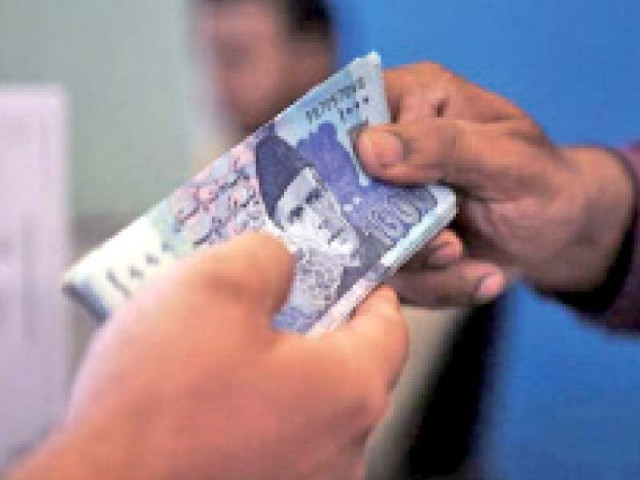Regional Tax Office gives 3-year salary in reward
FBR’s chairperson orders halt to disbursement with immediate effect

No sanctioned/unsanctioned amount of cash reward and honoraria may be disbursed by the field formations of FBR, IRS and PCS, said the instructions of the FBR to all field formations. PHOTO: FILE
The irregular action, which is in violation of instructions of the Prime Minister’s Office, forced the Federal Board of Revenue (FBR) on Monday to stop disbursement of the performance reward with immediate effect to thousands of employees.
“The department has taken action and an inquiry under the efficiency and disciplinary rules will begin only after exhausting laid-down procedures,” said FBR Chairperson Nausheen Javed while talking to The Express Tribune.
“All bills for reward and honoraria may be stopped for the issuance of cheques till the directives of the board,” said the official instructions issued on Monday.
The irregular action of a grade-21 officer, whose beneficiaries are about five-dozen officers, has, for now, deprived about 22,000 employees of the FBR of the annual performance reward. The annual performance reward is given for good performance.
The official record showed that a Karachi field formation gave up to 36-month salary in reward without following laid-down procedures. The chief commissioner went on to disburse Rs21.2 million to his favourites, though the Corporate-Regional Tax Office (RTO) showed only 7% improvement in tax collection over the previous year.
From July through April this year, the Corporate-RTO Karachi collected Rs116 billon, higher by only Rs8 billion or 7% as compared to the same period of last year.
“Sanction is hereby accorded for not exceeding Rs21.2 million payable to grade 01 to 19 of Inland Revenue, Corporate-Regional Tax Office, Karachi under the head of incentives, award and allied,” said the order issued by Dr Aftab Imam on May 5, the then chief commissioner Inland Revenue, FBR.
A grade-19 additional commissioner was given Rs2.6 million performance reward, which was equal to his 36-month basic salary. A deputy commissioner-level officer was given Rs2.8 million, equal to his three-year basic salary, showed the FBR documents.
After getting information about the alleged irregularity, the FBR gave orders for digging out the truth on June 1 and then sought explanation from the chief commissioner on June 8. The irregularity has been committed at a time when the FBR faces a record revenue shortfall of Rs1.7 trillion against its original target of Rs5.555 trillion.
However, the FBR chairperson believes that the revenue board performed exceptionally well by achieving 27% growth in domestic taxes before the Covid-19 turned things topsy-turvy. Owing to severe fiscal constraints and the International Monetary Fund’s (IMF) pressure, the government did not increase salaries of civilian employees and military personnel. Yet, there were elements in the FBR who dared to challenge instructions of the PM Office.
“The competent authority has directed that no sanctioned/unsanctioned amount of cash reward, honoraria may be disbursed by the field formations of FBR, the IRS and PCS,” said the instructions issued by the FBR headquarters to all field formations on Monday.
Now, the Accountant General of Pakistan Revenue has written letters to eight officers for the recovery of undue reward.
It was not an isolated incident as some other field offices also sanctioned more than six performance rewards against instructions of giving only up to six rewards. Another RTO sought permission from the member Inland Revenue Operations to give 36 rewards but the request was turned down.
On June 1, the FBR headquarters wrote a letter to Corporate-RTO Karachi Chief Commissioner Sajidullah Siddiqui and asked him to investigate whether the Rs21.2-million reward given by his predecessor was justified in accordance with the Reward Rules of 2016. The FBR headquarters also gave directives for finding out whether any reward sanctioning committee was constituted and performance of officers was reviewed before disbursing the money.
In his findings, Siddiqui conveyed that the board’s instructions for distributing reward were not followed. Also, no reward sanctioning committee was constituted and no “criteria were adopted for disbursing the reward to the officers and officials”.
On June 8, FBR Member Administration Faiz Elahi Memon sought explanation from the previous chief commissioner about ignoring the FBR’s instructions while disbursing the money. The reply had been sought within seven days, which was not received till Monday evening.
Violation of cabinet decision
In May 2018, the federal cabinet had reviewed the mechanism for the grant of performance allowance and honorariums to employees of the federal government with approval of the Economic Coordination Committee (ECC) chairman.
The cabinet directed that a “policy for the grant of honorarium may be presented to the new elected government for approval”.
Instead of placing the requisite policy before the federal cabinet, the Ministry of Finance last year reverted to the previous practice of allowing honorarium to the employees of different ministries, divisions and departments with approval of the ECC chairman, according to prime minister secretary’s correspondence with the finance ministry.
“The prime minister has been pleased to direct that the Finance Division shall, in compliance with the cabinet’s decision, immediately place a draft policy before the federal cabinet,” said PM Secretary Azam Khan’s instructions to the ministry.
Published in The Express Tribune, June 16th, 2020.
Like Business on Facebook, follow @TribuneBiz on Twitter to stay informed and join in the conversation.



















COMMENTS
Comments are moderated and generally will be posted if they are on-topic and not abusive.
For more information, please see our Comments FAQ